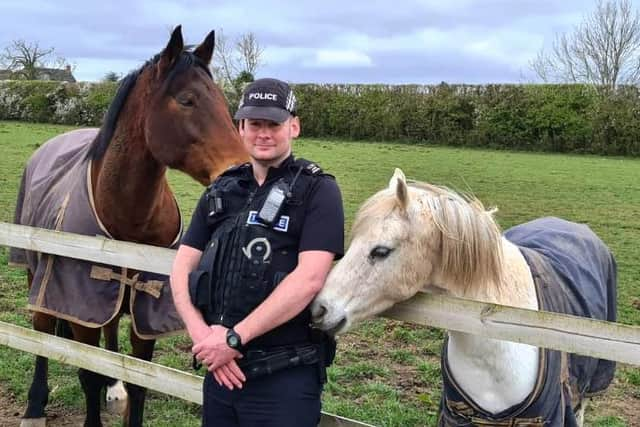Police step up efforts to crack down on wildlife and countryside crime across Harborough
and live on Freeview channel 276
Police are stepping up efforts to crack down on wildlife and countryside crime across Harborough.
Six officers dedicated to tackling rural crime throughout the district have received special training to make them even more effective in the frontline fight.
Advertisement
Advertisement
They are among 18 officers in Leicester, Leicestershire and Rutland who have just done a five-day wildlife training course to get a better insight into rural issues and laws.


The special team will be targeting offences such as hare coursing, poaching and interfering with protected species like badgers.
The crimes pose a continuing problem and threat in districts like Harborough.
Farmers and landowners are regularly being hit by countryside criminals venturing on to their land and damaging it to chase hares or steal high-value tractors and other vehicles and machinery in remote parts of Harborough.
Advertisement
Advertisement
PC James Johnson has worked for Leicestershire Police for seven and a half years and has just become a wildlife officer alongside his day-to-day duties as a beat officer.
“This is something that has always been close to my heart.
“My great-grandparents had a farm that was passed down the family. “My dad grew up on a farm and I have also married into a farming family, so it’s always something that has been in my life,” said PC Johnson.
“It’s an issue that’s very personal to me.
“I look forward to giving something back to the community and providing a good service from the force.”
PC Jon Barlow is another officer to join the wildlife team.
He said: “For the past three years I have been the local beat officer for a rural beat.
Advertisement
Advertisement
“So this new role brings a number of great challenges investigating these kinds of incidents and working with the community.”
Sgt Peter Jelbert, who’s based at Market Harborough police station, said: “Leicestershire and Rutland are very rural counties.
“So to be able to learn and refresh our knowledge of legislation which has an effect on our rural communities will be a real bonus.
“The greatest positive will be to our rural communities and to other partnerships such as the RSCPA.”
Advertisement
Advertisement
Police are acting as local farmers have seen a surge in fly-tipping, trespass, hare coursing and theft with regional crime costing farm businesses thousands of pounds.
Over 150 farmers and growers told a rural crime survey carried out by the National Farmers Union that they want to see more police resources put into tackling the menace.
Some 45 per cent said they suffered at least one crime last year.
The survey also showed that security at regional farm businesses has been beefed up with East Midlands farmers splashing out more than £5,500 on crime prevention and security on average.
Advertisement
Advertisement
As well as the usual lines of communication with police officers, 28% of farmers revealed they were turning to mobile phone WhatsApp groups to report rural crime and pass on intelligence - although 78% said they did not have regular contact with the police other than when reporting incidents.
The survey was conducted by phone and online by the NFU’s in-house research team to help assess the level of rural crime, ahead of the police and crime commissioner (PCC) elections on May 6.
James Peck, NFU East Midlands communications adviser, said: “Rural crime remains a blight on the countryside. We are concerned, but sadly not surprised, that so many of our members have been affected.
“However, the survey also shows the rural community is fighting back, introducing additional security measures to farms and working more closely with the police.
Advertisement
Advertisement
“Many members appreciate the response they receive from the police on rural crime but feel that rural teams are under-funded and under-resourced.
“We do work closely with the police in our area and have seen some excellent results from their respective rural crime teams and more than half, 55%, of those who took part in the survey said they did not experience any crime in 2020.”
The survey revealed that 60% had reported the most recent incident to the police but farmers said they were less likely to report trespass, fly-tipping and cyber-crime.
A lack of police response, the crime being too minor and the time it took to report a crime were the top three reasons why respondents said they did not flag up incidents with officers.
Advertisement
Advertisement
Mr Peck added: “Crimes like hare coursing, fly-tipping, dog attacks on livestock and theft of large and small machinery have left rural residents feeling more vulnerable. They also have knock-on effects on farm businesses.
“Despite this, rural areas continue to receive lower levels of police funding, per head of population, than urban areas*.
“We will be using the survey findings in our discussions with Police and Crime Commissioner candidates to help ensure rural policing receives the resources it needs, and rural communities deserve.”